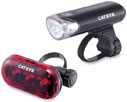Get Ready to Roll
Ready to roll? You’ll just need a few essential accessories. These items will cost a little extra, but they’ll keep you commuting safely and comfortably for years. Thanks to our friends at the League of American Bicyclists for this information. For help getting started, request a bike commute plan or contact our bicycle program coordinator.
“MUST” HAVES (safety and security)
 |
HELMET Protect those brains. Today’s helmets are light, airy, and comfortable. Most important, they reduce risk of head injury by 85 percent. Investment: $30–$160 (as little as $25 at the Campus Bike Shop) |
|---|---|
 |
LIGHTS A front head light and rear red reflector are required by law when riding at night. Be safe and make sure you have a working light and working batteries. Lighting can be basic or high-tech. Investment: $20–$100 |
 |
LOCK Use a U-shaped lock and lock your bike every time, even if you only plan to be away for minute. Lock your bike to a bike rack when possible and make sure you lock your bike wheel and frame to the bike rack to deter theft; refrain from kickstand parking your bike as the bike can easily be carried away. Stop by our Bike Safety Station most Fridays at White Plaza from 11 a.m. - 2 p.m. for a free demo on proper lock up. Investment: $40–$100 |
GOOD TO HAVE (comfort, convenience, and safety)
 |
PUMP Tires need air, so get two—a floor pump for home, and a frame pump for on-the-road flats. Checking air pressure before each ride can deter flats and ensure a smooth ride. Investment: $20–$60 Note: Free bike safety stands with pump and free tools are located throughout campus. |
|---|---|
 |
TOOL KIT A patch kit ($5), a spare inner tube ($5), and a mini multi-use tool ($30), are handy to have. Put them in a seat bag ($15), or your jersey pockets. Investment: $10–$40 |
 |
BIKE CLOTHES A bright colored vest or jacket can make you more visible. Moisture wicking jerseys keep you warm and dry without bunching or flapping. Shorts with a built-in padded chamois liner keep your rear from getting sore and prevent chafing. Today’s shorts come in baggy and women-specific “skort” styles, so you don’t have to pedal in tight-fitting Lycra if you don’t want to. Investment: $30–$100 |
 |
BOTTLES AND CAGES Staying hydrated is important. Grab two bottles and bottle cages (the shop can install). Investment: $15 |
 |
GLOVES Palm padding cushions your hands and protects your skin should you fall. Investment: $10–$40 |
 |
BASKET Carry all your extra things in a backpack, basket or panniers—bags that clip to the bike rack that are waterproof or weather resistant. It is dangerous to carry things in your hands as you always need to maintain control of your bike and be prepared for surprises, such as someone running across the path or the need to avoid a pothole or debris in the roadway. Investment: $30–$200 |
And, of course – A BIKE!

How do you know the best bike for you? Bikes range from entry-level bikes to get you around campus or ride short distances, to commuter-style bikes for longer distances, all the way up to high-end road racing bikes. Bikes can last almost a lifetime if maintained and serviced, so think of it as a long-term investment. We recommend you visit a local independent bicycle retailer that can provide expert advice on what type of bike you need, has knowledgeable sales staff and mechanics, and offers full-service repairs and a warranty for your purchase. Visit the Campus Bike Shop at White Plaza or check out the list of shops within a two-mile radius of the campus. Used bikes are a good idea, too, if you can find one in good condition. When purchasing a used bike, make sure you have it checked out by a mechanic to be sure it is safe prior to riding.
Investment: $200 to $1,000+
If you’re not sure how to use any accessories or tools, ask the shop mechanic for a quick demo. Also be sure to learn basic on-the-road bike repair, such as fixing a flat, repairing a chain, and tightening loose bolts. Check out some of the local bike shops for free scheduled maintenance sessions or send an email to be notified of our next fix-a-flat clinic or to ask questions: bike-information@stanford.edu
Bicycle repair stands
